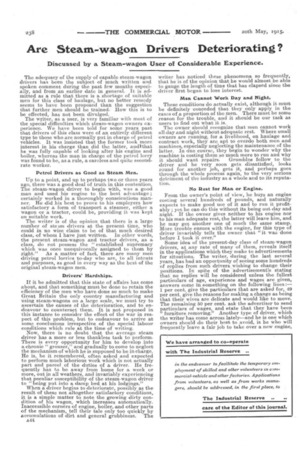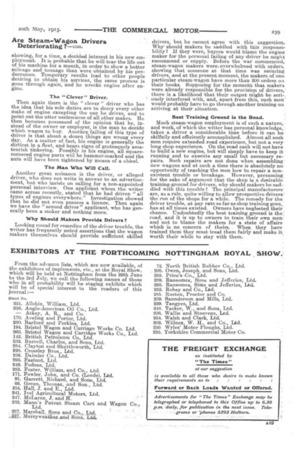Are Steam-wagon Drivers Deteriorating ?
Page 16

Page 17

If you've noticed an error in this article please click here to report it so we can fix it.
Discussed by a Stearn-wagon User a Considerable Experience.
The adequacy of the supply of capable steam-wagon drivers has been the subject of much written and spoken comment during the past few months especially, and from an earlier date in general. It is admitted as a rule that there is a shortage of suitable men for this class of haulage, but no better remedy seems to have been proposed than the suggestion that further men should be trained. How this is to be effected, has not been divulged.
The writer, as a user, is very familiar with most of the special difficulties which steam-wagon owners experience. We have been told for some years past that drivers of this class were of an entirely different type to those who are normally put in charge of petrol vehicles. It was insisted that the former took more interest in his charge than did the latter, andlthat he was fully capable of looking after his engine and boiler, whereas the man in charge of the petrol lorry was found to be, as a rule, a careless and quite secondrate worker.
Petrol Drivers as Good as Steam Men.
Up to a point, and up to perhaps two or three years ago, there was a good deal of truth in this contention. The steam-wagon driver to begin with, was a. good man and used his engine to the best advantage ; certainly worked in a thoroughly conscientious manner. He did his best to prove to his employers how satisfactory a form of transport a steamer, either a wagon or a tractor, could be, providing it was kept on suitable work.
The writer is of the opinion that there is a large nuniber of storm drivers at the present time, who could in no wise claim to be of that much desired class, of whom I have just written. In other words, the present steam-wagon and tractor drivers, as a class, do riot possess the "established supremacy which was once unequivocally assigned to them by right." As a matter of fact, there are many men driving petrol lorries to-day who are, to all intents and purposes, as good in every way as the best of the original steam-wagon men.
Driver& Hardships.
If it be admitted that this state of affairs has come about, and that something must be done to retain the efficiency of the men who have done so much to make Great Britain the only country manufacturing and using steam-wagons on a large scale, we must try to ascertain the causes of the deterioration, and to endeavour to counteract them. It is not proposed in this instance to consider the effect of the war in respect of this problem, but to endeavour to arrive at some conclusions irrespective of the special labour conditions which rule at the time of writing. Now, there is no doubt that the average steam driver has a more or less thankless task to perform. There is every opportunity for him to develop into a chronic "grouser," and gradually to come to neglect the mechanism of which he is supposed to be in charge. He is, be it remembered, often asked and expected to perform much laborious work which is not actually part and parcel of the duties of a driver. He frequently has to be away from home for a week or more, out in all weathers, and invariably experiencing that peculiar susceptibility of the steam-wagon driver to " being put into a damp bed at his lodgings." When a driver begins to deteriorate possibly. as the result of these not altogether satisfactory conditions, it is a simple matter to note the growing dirty condition of his wagon, which increases automatically. Inaccessible corners of engine, boiler, and other parts of the mechanism, tell their tale only too quickly by accumulations of dirt and general grubbiness. The
A44 writer has noticed these phenomena so frequently, that he is of the opinion that he would almost be able to gauge the length of time that has elapsed since the driver first began to lose interest.
Men Cannot Work Day and Night,
These conditions do actually exist, although it must be definitely conceded that they only apply in the cases of a proportion of the men. There must be some reason for the trouble, and it should be our task as users to find out what it is.
The owner should recognize that men cannot work all day and night without adequate rest. -Where small owners are running, for a livelihood, on haulage and contract work, they are apt to overdo both men and machines, especially neglecting the maintenance of the latter. In due course, they begin to wonder why the machine is costing them so much more to run and why it should want repairs. Grumbles follow to the driver and he very soon gets dissatisfied, looks round for another job, gets it, and perhaps goes through the whole process again, to the very serious detriment of the industry as a whole and to its reputation.
No Rest for Man or Engine.
From the owner's point of view, he buys an engine costing several hundreds of pounds, and naturally expects to make good use of it and to run it profitably ; yet he can do this without its being out day and night. lithe owner gives neither to his engine nor to his man adequate rest, the latter will leave him, and he may get another one of much the same stamp. More trouble ensues with the engine, for this type of driver invariably tells the owner that "it was done before I took it over."
Some idea of the present-day class of steam-wagon drivers, at any rate of many of them, reveals itself in the applications which they make to advertisements for situations. The writer, during the last several years, has had an opportunity of seeing some hundreds of replies from such drivers wishing to change their positions. In spite of the advertisement's stating that no replies will be considered unless the fullest particulars of age, experience and wages are given, answers come in something on the following lines:1 per cent, give the particulars that are asked for, 49 per cent, give the reasons for making a change as being that their wives are delicate and would like to move. The remaining 50 per cent. ask the advertiser to send particulars of wages, and state that they have been furniture removing." Another type of driver, which the writer has come across lately—and he is one which owners should do their best to avoid, is he who will frequently leave a fair job to take over a new engine, showing, for a time, a decided interest in his new employment. It in probable that he will tear the life out of his machine fox a month, in order to,show a better mileage and tonnage than were obtained by his predecessors. Tempoiary results lead to other people desiring to obtain his services, the same process is gone through again, and he wrecks engine after engine.
The "Clever" Driver.
Then again there is the " clever " driver who has the idea that his sole duties are to decry every other make of engine excepting the one be drives, and to point out the utter uselessness of all other makes. He then becomes possessed of the opinion that he, instead of the owner or employer, is the man to decide which wagon to buy. Another, failing of this type of driver is that about a dozen things are wrong every day. As a matter of fact, his engine is generally the dirtiest in a fleet, and bears signs of grotesquely amateurish tinkering. Possibly in his engine, all squarecornered engine parts will be hammer-marked and the nuts will have been tightened by means of a chisel.
The Man Who Will Call.
Another great nuisance is the driver, or alleged driver, who does not write in answer to an advertisement, but who insists on calling for a non-appointed personal interview. One applidant whom the writer came across recently, stated that he had driven "all types of engines everywhere." Investigation showed that he did not even possess a licence. Then again we have the "second driver" applicant, who has generally been a stoker and nothing more.
Why Should Makers Provide Drivers?
Looking round for remedies of the driver trouble, the writer has frequently noted assertions that the wagon makers themselves should provide sufficient skilled
drivers, but he cannot agree with this suggestion. Why should Makers be saddled with this responsibility? If they were, buyers would blame the engine maker for the personal failing of any driver he might recommend or supply. Before the war commenced, steam-wagon makers were overwhelmed with orders, showing that someone at that time was securing drivers, and at the present moment, the makers of one particular steam-wagon have more than 200 orders on their books. Supposing for the moment that makers were already responsible for the provision of drivers, there is a likelihood that their output might be seriously interfered with, and, apart from this, such men' would probably have to go through another training on arriving at their situation.
Best Training Ground is the Road.
Much steam-wagon employment is of such a nature, and work, of which the writer has personal knowledge, : takes a. driver a considerable time before it can be skilfully and efficiently accomplished. Almost all such men require extended road experience. but not a very • long shop experience. On the road each will not have to build a new engine, but will simply have to keep it running and to execute any email but necessary re" pairs. Such repairs are not done when assembling' new wagons and at such a time there is absolutely no opportunity of teaching the men how to repair a nonexistent trouble or breakage. However, presuming for the sake of argument that the shop is a desirable training-ground for drivers, why should makers be saddled with this trouble 7 The principal manufacturers are, as a rule, quite willing to allow prospective drivers' the run of the shops for a while. The remedy for the driver trouble, at any rate so far as shop training goes,. has at all times existed. Owners have neglected their chance. Undoubtedly the best training ground is the: road, and it is up to owners to train their own mere and not to blame the makers for a state of affairs which is no concern of theirs. When . they have trained them they must treat them fairly and make it worth their while to stay with them. '






















